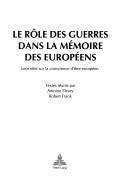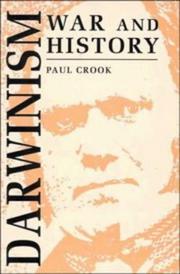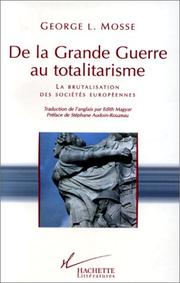| Listing 1 - 10 of 11 | << page >> |
Sort by
|
Book
ISBN: 9782130582786 2130582788 Year: 2011 Publisher: Paris: PUF,
Abstract | Keywords | Export | Availability | Bookmark
 Loading...
Loading...Choose an application
- Reference Manager
- EndNote
- RefWorks (Direct export to RefWorks)
Pourquoi donne-t-on la mort ? Qu'il soit le fait d'un individu ou d'un groupe, l'homicide apparaît paradoxalement aux yeux du témoin "civilisé" comme un acte inimaginable, alors que la pulsion de tuer est aussi fondamentalement inscrite dans la nature humaine que la pulsion sexuelle elle-même. Face à ces actes innommables, la société ne sait que multiplier les termes propres à les rejeter : "barbarie collective", "folie individuelle", autant de manières de répéter à l'infini la question sans se donner les moyens de répondre sur ce qui s'est effectivement passé et qui peut refaire surface à tout moment, en tous lieux et à toute époque. D'où la nécessité d'interpréter ce refoulement entre nous-même et l'acte de donner la mort pour dépasser les impasses de l'incompréhension, sortir de la fascination morbide et penser les conditions individuelles et collectives favorables à une sublimation qui redirigerait le pulsionnel vers d'autres buts. L'auteur propose dans ce livre trois figures dont le point commun est de s'avancer au plus près de la pulsion homicide, inaccessible même pour celui qui commet l'acte et n'en mesure souvent qu'après coup la nature et la portée : tuer pour défendre son identité, tuer pour survivre, tuer par ivresse de la toute-puissance.
Murder --- War --- Guerre --- Psychological aspects. --- Aspect psychologique --- Crime --- --Meurtre --- --Psychanalyse --- --Violence --- --Terrorisme --- --Massacre --- --Murder --- Psychological aspects --- Meurtre --- Psychanalyse --- Violence --- Terrorisme --- Massacre --- Murder - Psychological aspects --- War - Psychological aspects
Book
ISBN: 9782849243411 2849243418 Year: 2013 Publisher: Paris: Éd. du Cygne,
Abstract | Keywords | Export | Availability | Bookmark
 Loading...
Loading...Choose an application
- Reference Manager
- EndNote
- RefWorks (Direct export to RefWorks)
Etudes pluridisciplinaires consacrées au développement de la notion de trauma au XXe siècle, envisagé sous l'angle psychanalytique et historique, à ses utilisations au sein des différentes théories (notamment celle du peacebuilding) et à ses applications dans les conflits contemporains.
Conflict management --- War --- Traumatism --- Gestion des conflits --- Guerre --- Traumatisme --- Psychological aspects --- Aspect psychologique --- Post-traumatic stress disorder --- Psychic trauma --- Peace building --- Conflict management - Psychological aspects --- Peace building - Psychological aspects --- War - Psychological aspects
Book
ISSN: 02992833 ISBN: 9782204088732 2204088730 Year: 2009 Publisher: Paris: Cerf,
Abstract | Keywords | Export | Availability | Bookmark
 Loading...
Loading...Choose an application
- Reference Manager
- EndNote
- RefWorks (Direct export to RefWorks)
La célébration du 70e anniversaire de la mort de Freud (septembre 1939) est l'occasion d'une réflexion sur sa théorie de la guerre et de la mort. Fondée sur le mythe de la horde primitive, le meurtre du père et la dette commune, la société, selon Freud, s'organise autour des interdits de meurtre et d'inceste. La guerre fondée dans la pulsion de mort est la conséquence de la levée collective de ces interdits. Freud bâtit ainsi ce que l'on pourrait nommer une " culture du meurtre ". Mais dès la Première Guerre mondiale, il avait saisi qu'un bouleversement était en train de s'opérer avec la guerre totale, industrielle et informationnelle. Tout en restant fondamentalement et radicalement enraciné dans la pensée freudienne, ce travail tente de démontrer un "au-delà " de Freud dans l'apparition d'une " culture de l'extermination " qui trouve son origine dans les grands textes fondateurs des monothéismes, puis son champ de réalisation dans l'histoire occidentale principalement. Cette " culture de l'extermination " n'a pas disparu avec les horreurs du siècle dernier. Elle est toujours bien présente partout dans le monde et prête à ressurgir en Occident comme le laissent entrevoir quelques frémissements politiques dans de nombreux pays. Il faut donc demeurer lucide et vigilant.
Psychoanalysis --- Genocide --- War --- Political aspects --- Psychological aspects --- Psychological aspects. --- Freud, Sigmund, --- Psychoanalysis - Political aspects --- Genocide - Psychological aspects --- War - Psychological aspects. --- Freud, Sigmund, - 1856-1939 - Criticism and interpretation --- Freud, Sigmund, - 1856-1939
Book
ISBN: 9782251446370 2251446370 Year: 2017 Volume: 19 Publisher: Paris: Les Belles Lettres,
Abstract | Keywords | Export | Availability | Bookmark
 Loading...
Loading...Choose an application
- Reference Manager
- EndNote
- RefWorks (Direct export to RefWorks)
Soldiers --- War --- Afghan War, 2001 --- -Diaries. --- Psychology --- Biography --- Psychological aspects --- Participation, French --- Mali --- France --- Africa, Central --- History --- History, Military --- Psychology. --- -Psychology. --- Psychological aspects. --- Participation, French. --- France. --- Afghan War, 2001-2021 --- Soldiers - France - Diaries. --- Soldiers - France - Psychology. --- Soldiers - France - Biography. --- War - Psychological aspects. --- Afghan War, 2001- - Participation, French. --- Mali - History - Tuareg Rebellion, 2012 --- -France - History, Military - 21st century. --- Africa, Central - History - 21st century. --- -Mali
Book
ISBN: 9789004428744 9004428747 9789004424173 9004424172 Year: 2020 Volume: 130 Publisher: Leiden, The Netherlands ; Boston : Brill,
Abstract | Keywords | Export | Availability | Bookmark
 Loading...
Loading...Choose an application
- Reference Manager
- EndNote
- RefWorks (Direct export to RefWorks)
The First World War and Health: Rethinking Resilience considers how the First World War (1914-1918) affected mental and physical health, its treatment, and how the victims – not only soldiers and sailors, but also medics, and even society as a whole - tried to cope with the wounds sustained. The volume, which contains over twenty articles divided into four sections (military, personal, medical, and societal resilience), therefore aims to broaden the scope of resilience: resilience is more than the personal ability to cope with hardship; if society as a whole cannot cope with, or even obstructs, personal recovery, resilience is difficult to achieve. Contributors are Carol Acton, Julie Anderson, Leo van Bergen, Ana Carden-Coyne, Cédric Cotter, Dominiek Dendooven, Christine van Everbroeck, Daniel Flecknoe, Christine E. Hallett, Hans-Georg Hofer, Edgar Jones, Wim Klinkert, Harold Kudler, Alexander McFarlane, Johan Meire, Heather Perry, Jane Potter, Fiona Reid, Jeffrey R. Reznick, Stephen Snelders, Hanneke Takken, Pieter Trogh, and Eric Vermetten.
World War, 1914-1918 --- Psychological aspects --- E-books --- History of human medicine --- Psychiatry --- anno 1910-1919 --- War --- Resilience (Personality trait) --- Medical care --- Medical aspects --- Psychological aspects. --- Medical care. --- Medical aspects. --- World War, 1914-1918 - Medical care --- War - Psychological aspects --- War - Medical aspects --- World War, 1914-1918 - Psychological aspects
Book
ISBN: 9782847346367 2847346368 9791021009530 Year: 2009 Publisher: Paris: Tallandier,
Abstract | Keywords | Export | Availability | Bookmark
 Loading...
Loading...Choose an application
- Reference Manager
- EndNote
- RefWorks (Direct export to RefWorks)
Conflit --- --XXe s., --- Guerres mondiales --- --Démobilisation --- --Psychologie --- --World War, 1914-1918 --- World War, 1939-1945 --- War --- Veterans --- Psychological aspects --- Mental health --- Termination --- World War, 1914-1918 --- XXe s., 1901-2000 --- Démobilisation --- Psychologie --- World War, 1914-1918 - Psychological aspects - Congresses --- World War, 1939-1945 - Psychological aspects - Congresses --- War - Psychological aspects - Congresses --- Veterans - Mental health - Congresses --- War - Termination - Congresses --- Guerre mondiale (1914-1918) --- Guerre mondiale (1939-1945) --- Guerre --- Anciens combattants --- Paix --- Aspect psychologique --- Aspect social --- 20e siècle --- Fin

ISSN: 09442294 ISBN: 3906754847 9783906754840 Year: 1997 Volume: 8 8 Publisher: Berne: Lang,
Abstract | Keywords | Export | Availability | Bookmark
 Loading...
Loading...Choose an application
- Reference Manager
- EndNote
- RefWorks (Direct export to RefWorks)
History of Europe --- anno 1900-1999 --- Group identity --- War --- Identité collective --- Guerre --- Psychological aspects --- Aspect psychologique --- Consciousness. --- World War, 1914-1918 --- World War, 1939-1945 --- War and civilization --- History --- Influence. --- Psychological aspects. --- Identité collective --- Consciousness --- Morale --- Civilization and war --- Civilization --- Collective identity --- Community identity --- Cultural identity --- Social identity --- Identity (Psychology) --- Social psychology --- Collective memory --- Apperception --- Mind and body --- Perception --- Philosophy --- Psychology --- Spirit --- Self --- Influence --- Europe --- Council of Europe countries --- Eastern Hemisphere --- Eurasia --- Group identity - Europe - History - 20th century. --- World War, 1914-1918 - Influence. --- World War, 1939-1945 - Influence. --- War - Psychological aspects. --- War and civilization - Europe.

ISBN: 0521466458 0521444659 0511521340 Year: 1994 Publisher: Cambridge New York Cambridge University Press
Abstract | Keywords | Export | Availability | Bookmark
 Loading...
Loading...Choose an application
- Reference Manager
- EndNote
- RefWorks (Direct export to RefWorks)
While much has been written upon Social Darwinism, the historical impact of Darwinism upon theories of war and human aggression has been sadly neglected. This book is the first to study this discourse in depth. It challenges the received view that Darwinism generated essentially aggressive and warlike social values and pugnacious images of humankind. Paul Crook reconstructs the influential discourse of 'peace biology', whose liberal vision was of a basically free humanity, not fettered by iron laws of biological necessity or governed by violent genes. By exploring a gamut of Darwinian readings of history and war, mainly in the English-speaking world to 1919, this study throws new light upon militarism, peace movements, the origins of World War I and British social thought.
Aggressiveness (Psychology) --- Biopolitics --- Peace --- Social Darwinism --- War --- Darwinisme social --- History --- Psychological aspects --- Histoire --- Darwin, Charles, --- Influence --- Aggressiveness --- World War, 1914-1918 --- History. --- Causes. --- Darwin, Charles Robert --- Causes --- Aggressiveness (Psychology) - History. --- Social Darwinism - History. --- Biopolitics - History. --- World War, 1914-1918 - Causes. --- War - Psychological aspects - History. --- Peace - Psychological aspects - History. --- Influence. --- Arts and Humanities --- Coexistence, Peaceful --- Peaceful coexistence --- International relations --- Disarmament --- Peace-building --- Security, International --- Armed conflict (War) --- Conflict, Armed (War) --- Fighting --- Hostilities --- Wars --- Military art and science --- Political behavior --- Human behavior --- Political science --- Sociobiology --- Darwinism, Social --- Competition --- Social change --- Social conflict --- Social evolution --- Aggression (Psychology) --- Aggressive behavior --- Psychology --- Defensiveness (Psychology) --- Fighting (Psychology) --- Toughness (Personality trait) --- Darwin, Charles, Robert --- HISTOIRE INTELLECTUELLE --- SPENCER (HERBERT) --- HUXLEY (ALDOUS), 1894-1963 --- HISTOIRE SOCIALE --- 19E-20E SIECLES --- PENSEE POLITIQUE ET SOCIALE --- HISTORIOGRAPHIE

ISBN: 2012354483 9782012354487 Year: 1999 Volume: *4 Publisher: Paris: Hachette littératures,
Abstract | Keywords | Export | Availability | Bookmark
 Loading...
Loading...Choose an application
- Reference Manager
- EndNote
- RefWorks (Direct export to RefWorks)
Bibliotheek François Vercammen
History of Europe --- anno 1900-1999 --- Civilization and war --- Guerre et civilization --- Oorlog en beschaving --- War and civilization --- World War, 1914-1918 --- Totalitarianism --- Guerre et civilisation --- Première guerre mondiale --- Totalitarisme --- Influence --- History --- Histoire --- Europe --- Civilization --- Politics and government --- Civilisation --- Politique et gouvernement --- War --- War and civilization. --- European War, 1914-1918 --- First World War, 1914-1918 --- Great War, 1914-1918 --- World War 1, 1914-1918 --- World War I, 1914-1918 --- World War One, 1914-1918 --- WW I (World War, 1914-1918) --- WWI (World War, 1914-1918) --- History, Modern --- Morale --- Psychological aspects. --- World War (1914-1918) --- History, Military --- War memorials --- Psychological aspects --- Première guerre mondiale --- 20th century --- History [Military ] --- War - Psychological aspects --- World War, 1914-1918 - Europe - Psychological aspects --- War memorials - Europe --- Europe - Civilization - 20th century --- Europe - History, Military - 20th century --- Aspect psychologique. --- Fascisme. --- Guerre et civilisation. --- Guerre mondiale (1914-1918) --- Guerre mondiale, 1914-1918 --- Guerre --- Guerre. --- Histoire militaire. --- Monument commémoratif. --- Mythes politiques --- Totalitarisme. --- Aspect anthropologique. --- Influence. --- Aspect psychologique --- Europe. --- Histoire militaire --- Mémoire collective --- Mémoire collective. --- Monuments.
Book
ISBN: 146141637X 1785396382 1461416371 1461416388 Year: 2013 Publisher: New York : Springer,
Abstract | Keywords | Export | Availability | Bookmark
 Loading...
Loading...Choose an application
- Reference Manager
- EndNote
- RefWorks (Direct export to RefWorks)
Armed conflict, on domestic or foreign soil, impacts people’s daily lives and shapes policy around the world. Millions live with the threat of terrorism, whether from random sources or known enemies. And the acceptability of torture is debated by politicians and public alike. The International Handbook of War, Torture, and Terrorism synthesizes historical backgrounds, current trends, and findings from the Personal and Institutional Rights to Aggression and Peace Survey (PAIRTAPS), administered in forty countries over nine global regions. Contributors examine the social, cognitive, and emotional roots of people’s thinking on war and national security issues, particularly concerning the role of governments in declaring war, invading other countries, or torturing prisoners. By focusing on the cultural traditions and colonial histories of broad regions rather than of individual nations, the book demonstrates how context shapes ordinary citizens’ views on what is justifiable during times of war, as well as more nebulous concepts of patriotism and security. The Handbook: Introduces the PAIRTAPS and explains the methodology for analyzing responses. Defines war-related concepts from the unique perspectives of Western Europe, U.K./U.S., Middle East, Gulf States, Russia/Balkans, Africa, Latin America, South/Southeast Asia, and East Asia. Provides an integrative summary of definitions and points of view. Situates results in terms of social engagement/disengagement theory. Considers implications for peace and reconciliation. As a reflection of the changing global landscape, the International Handbook of War, Torture, and Terrorism deserves to be read by a wide range of researchers in peace psychology, political science, sociology, and anthropology.
Terrorism -- Psychological aspects -- Handbooks, manuals, etc. --- Torture -- Psychological aspects -- Handbooks, manuals, etc. --- War -- Moral and ethical aspects -- Handbooks, manuals, etc. --- War -- Psychological aspects -- Handbooks, manuals, etc. --- War --- Torture --- Terrorism --- Social Sciences --- Military & Naval Science --- Law, Politics & Government --- Psychology --- Military Science - General --- Psychological aspects --- War. --- Torture. --- Terrorism. --- Acts of terrorism --- Attacks, Terrorist --- Global terrorism --- International terrorism --- Political terrorism --- Terror attacks --- Terrorist acts --- Terrorist attacks --- World terrorism --- Armed conflict (War) --- Conflict, Armed (War) --- Fighting --- Hostilities --- Wars --- Psychology. --- Political science. --- Sociology. --- Cross-cultural psychology. --- Cross Cultural Psychology. --- Sociology, general. --- Political Science. --- Cross-cultural psychology --- Ethnic groups --- Ethnic psychology --- Folk-psychology --- Indigenous peoples --- National psychology --- Psychological anthropology --- Psychology, Cross-cultural --- Psychology, Ethnic --- Psychology, National --- Psychology, Racial --- Race psychology --- National characteristics --- Social theory --- Social sciences --- Administration --- Civil government --- Commonwealth, The --- Government --- Political theory --- Political thought --- Politics --- Science, Political --- State, The --- Behavioral sciences --- Mental philosophy --- Mind --- Science, Mental --- Human biology --- Philosophy --- Soul --- Mental health --- Direct action --- Insurgency --- Political crimes and offenses --- Subversive activities --- Political violence --- Terror --- Cruelty --- Punishment --- Extraordinary rendition --- International relations --- Military art and science --- Peace --- Applied psychology. --- Applied psychology --- Psychagogy --- Psychology, Practical --- Social psychotechnics
| Listing 1 - 10 of 11 | << page >> |
Sort by
|

 Search
Search Feedback
Feedback About UniCat
About UniCat  Help
Help News
News